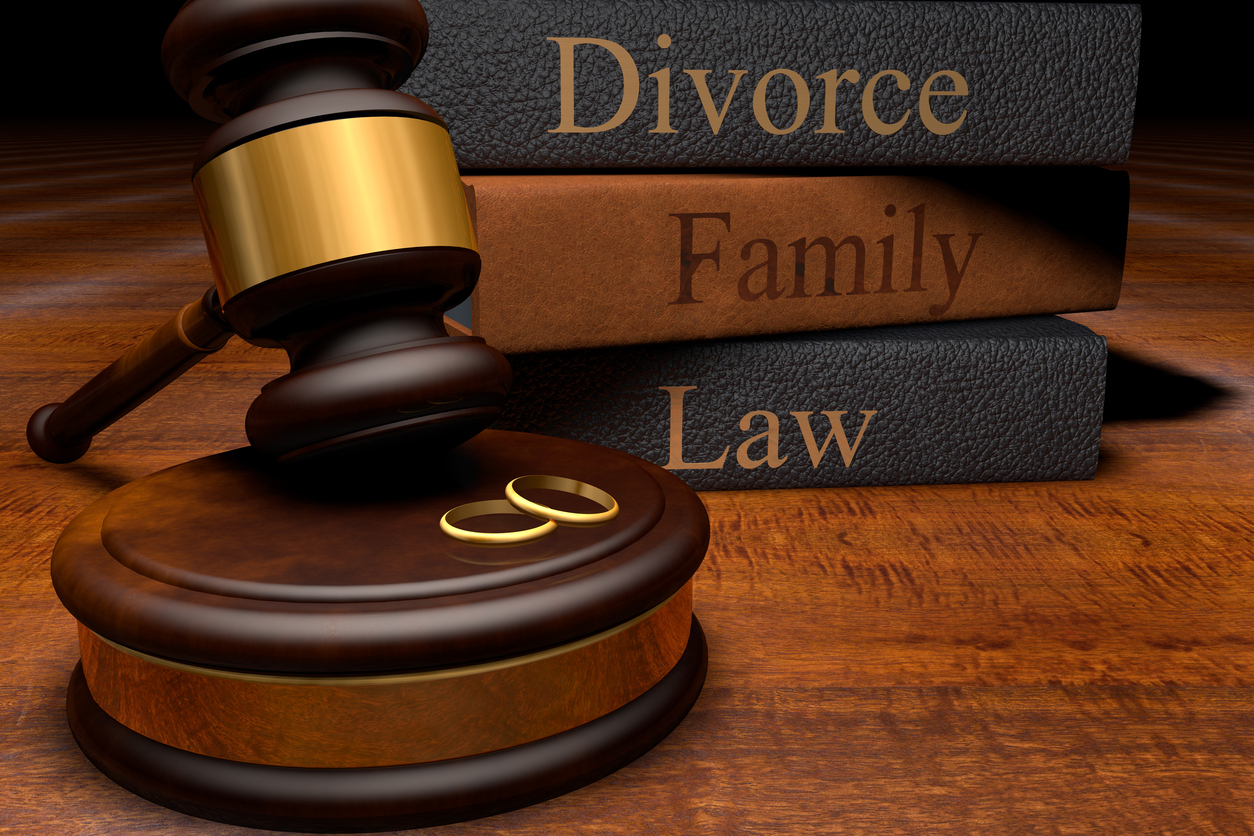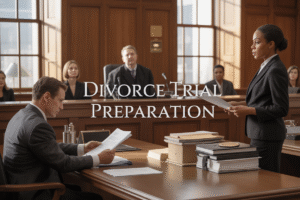Remember the day you realized your marriage was truly over? Probably felt like your world was collapsing and now you’re staring at lawyer websites wondering who to trust with the next chapter of your life.
Finding the right divorce attorney isn’t just about credentials—it’s about having someone who genuinely has your back during one of life’s most stressful transitions.
When choosing the right divorce attorney, you need someone who walks the line between compassionate counselor and fierce advocate. Someone who won’t drain your bank account fighting battles that don’t matter.
But how do you spot the difference between attorneys who’ll guide you to calmer waters versus those who’ll drag you into a needless war? The answer lies in recognizing some surprisingly subtle signals during your first meeting…
Understanding Your Divorce Needs
Assessing the complexity of your divorce case
Divorce is never one-size-fits-all. Before you start calling attorneys, take a hard look at your situation.
Are you dealing with substantial assets that need to be divided? Got a family business in the mix? These complications require a lawyer with specialized experience.
If you have kids, custody arrangements add another layer of complexity. Some attorneys specialize in child custody battles, while others excel at unraveling complex financial matters.
Consider whether your split is amicable or contentious. An angry ex who’s ready to fight over every coffee mug calls for a different kind of attorney than one who’s nodding along to reasonable terms.
Identifying your priorities and non-negotiables
What keeps you up at night about this divorce? That’s your priority.
Maybe it’s maintaining stability for your children. Perhaps it’s protecting your financial future or keeping the family home. Whatever matters most, write it down.
Your non-negotiables are your rigid boundaries – the hills you’re willing to die on. Be realistic here. Fighting for everything often means winning nothing.
A good exercise: Create three lists:
- Must-haves (I need this)
- Want-to-haves (I’d prefer this, but can compromise)
- Do n’t-cares (This doesn’t matter much to me)
This clarity helps you find an attorney whose strengths align with your priorities.
Determining your budget for legal representation
Divorce attorneys typically charge $350 to $600 per hour, although rates vary widely based on location and experience. Some require substantial retainers upfront, often $5,000 to $15,000 or more.
Ask yourself some tough questions:
- Can I afford a premium attorney?
- Might mediation work for my situation?
Remember, the most expensive attorney isn’t always the best for your specific case. Some specialized boutique firms deliver better results than larger, more established practices.
Don’t hide financial concerns from potential attorneys. Many offer payment plans or scaled services to accommodate different budgets.
Recognizing your communication style preferences
Some attorneys text. Others only communicate through formal emails or scheduled calls. This might seem trivial now, but trust me—three months into your divorce, communication style matters tremendously.
Do you want an attorney who:
- Does it break down legal jargon into plain English?
- Provides detailed explanations of everything?
- Gets straight to the point without fluff?
- Responds quickly to messages?
- Involves you in every decision?
Pay attention during your initial consultation. If you’re constantly confused by their explanations or frustrated by their communication approach, it won’t improve later.
Your attorney should make you feel heard, not intimidated. The right match respects your intelligence without talking down to you.
Red Flags When Selecting a Divorce Attorney
A. Promising unrealistic outcomes or guarantees
Watch out for attorneys who promise you’ll “get everything” or guarantee specific outcomes. Divorce is unpredictable, and no ethical attorney can promise you’ll keep the house, get full custody, or pay zero alimony. When a lawyer makes sweeping promises during your initial consultation, they’re either misleading you or don’t understand family law.
Real pros know better. They’ll discuss possibilities, outline realistic scenarios, and explain the factors that could influence your case. They’ll say things like “based on similar cases” or “the law tends to favor” rather than making ironclad guarantees.
If they’re promising the moon, they’re probably just trying to get you to sign their retainer agreement. And when those promises inevitably fall through? You’ll likely be disappointed, frustrated, and possibly face unexpected outcomes.
B. Lack of specialization in family law
Would you hire a dermatologist to perform heart surgery? Didn’t think so. So why trust your divorce to someone who mainly handles personal injury cases or real estate transactions?
Family law is a complex and constantly evolving field. A reasonable divorce attorney eats, sleeps, and breathes family law. They are familiar with the local judges’ tendencies, understand the nuances of custody evaluations, and stay current on alimony calculation methods.
When attorneys lack specialization, they miss critical details. They may not be aware of recent precedent-setting cases or the best experts to hire for their specific situation. Some even take divorce cases to fill gaps in their schedule.
Ask potential attorneys about the percentage of their practice that involves family law. If it’s under 75%, keep looking. Your future is too important to be someone’s side project.
C. Poor communication or responsiveness
Nothing feels worse than being ghosted by the person you’re paying to protect your future. If an attorney takes days to return your calls during the consultation phase, imagine how they’ll treat you when they’ve already cashed your check.
Pay attention to these early warning signs:
- Takes more than 24 hours to return initial calls
- Staff seem confused about who you are when you call
- Frequently reschedules appointments
- Checks emails or takes calls during your consultation
- Can’t explain complex issues in terms you understand
Communication problems only get worse under pressure. During critical moments in your case, you need an attorney who’s accessible and responsive. If they can’t make time for you now, they won’t magically become attentive later.
D. Inability to clearly explain fee structures
Money talks. And if your potential divorce attorney can’t clearly explain how and what they’ll charge you, run for the hills.
Vague statements like “it depends” without further explanation or “we’ll figure it out as we go” are major red flags. A professional attorney should be able to outline:
- Their hourly rate
- Estimated total costs based on similar cases
- Required retainer amount
- What happens when the retainer is depleted
- Additional costs like filing fees, expert witnesses, or depositions
Be especially cautious of attorneys who seem reluctant to put fee agreements in writing. If they’re evasive about money discussions, they might hit you with unexpected bills later.
Good attorneys know divorce is already stressful enough without financial surprises. They’ll help you budget appropriately for your legal expenses.
E. Dismissive of your concerns or goals
The divorce process isn’t just about splitting assets—it’s about your life, your children, and your future. An attorney who dismisses your priorities or steamrolls over your concerns isn’t serving you correctly.
Watch for these warning signs:
- Minimizes emotional concerns (“just get over it”)
- Pushes aggressive tactics when you want an amicable split
- Ignores questions about children’s well-being
- Seems more interested in fighting than resolving
Some attorneys create unnecessary conflicts because they generate more billable hours. Others lack the emotional intelligence to handle the human side of divorce.
Your attorney works for you, not the other way around. If they aren’t listening to what matters most to you during the consultation, they certainly won’t advocate for your priorities in court or negotiations.
Green Flags That Signal a Quality Divorce Attorney
Extensive experience in family law and divorce cases
Look, finding the right divorce attorney isn’t just about who has the fanciest office or the slickest website. What you need is someone who’s been in the trenches.
An attorney with extensive family law experience isn’t just familiar with divorce paperwork—they’ve seen it all. They know which judges prefer which arguments. They understand the unwritten rules of the local court system. And most importantly, they can tell you what’s worth fighting for and what’s not.
Good attorneys will talk specifics: “I’ve handled over 200 high-conflict custody cases,” or “I’ve worked with business valuations in divorce for 15 years.” They don’t just say they’re “experienced”—they show it.
Ask them about cases similar to yours. Their answer should demonstrate not just knowledge but wisdom gained from past successes and failures. That kind of battle-tested experience is worth its weight in gold when you’re fighting for your future.
Transparent about potential outcomes and challenges
The divorce attorney giving you sunshine and rainbows? Run.
A quality divorce lawyer won’t sugarcoat things. They’ll lay out the possible outcomes—good and bad—and help you understand what you’re really up against.
During your consultation, they should be saying things like:
- “Here’s where your case is strong…”
- “These areas might be challenging because…”
- “Based on similar cases, we might expect…”
They don’t make promises they can’t keep. Instead, they prepare you for the road ahead, bumps and all.
Great attorneys discuss multiple scenarios and help you plan for each one. They’ll tell you when your expectations might be unrealistic, even if that’s not what you want to hear. That honesty might sting at first, but it prevents much bigger disappointments down the road.
Clear, written fee agreements with no hidden costs
Nothing says “green flag” like a lawyer who’s upfront about money.
Quality divorce attorneys provide detailed, written fee agreements before you commit to anything. These agreements spell out:
- Their hourly rate
- Required retainer amounts
- What services are covered
- Additional costs you might incur
- Billing practices and frequency
They don’t hide behind vague terms or “we’ll figure it out later” promises. They’re specific and direct about costs.
The right attorney answers your money questions without getting defensive. They help you understand the financial commitment and don’t pressure you into signing anything immediately.
Remember: the least expensive attorney isn’t always the best value. What matters is transparency and fairness in how they charge for their expertise.
Responsive and respectful communication style
You’ll be sharing deeply personal information with your divorce attorney. The good ones understand this and communicate accordingly.
Green flags in communication include:
- Returning calls or emails within 24 hours
- Explaining legal concepts without talking down to you
- Listening instead of just waiting for their turn to speak
- Respecting your time during meetings
- Keeping you updated without you having to check in constantly
Please pay attention to how they interact with their staff, too. An attorney who treats their team poorly will likely treat you the same way once you’ve signed on.
Great attorneys make complex situations clearer, not more confusing. They don’t use legal jargon to intimidate you, and they never make you feel stupid for asking questions. Instead, they empower you with knowledge, enabling you to make informed decisions about your case.
Essential Questions to Ask During Consultations
About their specific experience with cases similar to yours
When you’re sitting across from a potential divorce attorney, don’t just nod along. Ask them point-blank: “Have you handled cases like mine before?”
If you’ve got kids, complex assets, or a high-conflict ex, you need someone who’s navigated these waters. Follow up with specifics like:
What percentage of your cases involve child custody disputes?”
How many business valuation cases have you managed in the past year?
“Tell me about a case you handled that’s similar to mine and what the outcome was.”
Listen carefully to their answers. A reasonable attorney won’t guarantee outcomes, but they’ll confidently share their relevant experience without vague generalities.
Regarding their approach to negotiation vs. litigation
The difference between a $30,000 divorce and a $100,000 one often comes down to this question. Ask directly:
“What’s your philosophy on settlement versus going to court?”
“What percentage of your cases settle without trial?”
“How do you determine when to push for a settlement versus preparing for a trial?”
Some attorneys are sharks who take everything to court. Others will avoid conflict at all costs. Neither extreme serves you well. You want someone who can negotiate effectively but isn’t afraid to litigate when necessary.
How they handle communication and updates
Nothing’s more frustrating than paying someone hundreds of dollars an hour and then not hearing from them. Nail down their communication style:
“How quickly do you typically respond to emails or calls?”
“Will I be working with you directly or mostly with paralegals?”
“How often will I receive updates on my case?”
“Do you provide itemized billing statements?”
The right attorney makes you feel like their only client, even when you’re not. If they’re vague or dismissive about communication during the consultation (when they’re trying to impress you), imagine how they’ll be once they have your retainer.
Their availability during your case timeline
Divorce doesn’t follow a 9-to-5 schedule, and emergencies happen. Figure out if they’ll be there when you need them:
“Do you have any planned vacations or trial commitments during the next six months?”
“Who handles emergencies when you’re unavailable?”
“How many cases are you actively managing right now?”
“What’s your typical timeline for cases like mine?”
You don’t need 24/7 access, but you do need to know they won’t be on a two-week cruise when your ex decides to empty the bank accounts.
Their strategy for protecting your specific interests
This is where you get down to brass tacks about what matters most to you:
“How would you approach protecting my interests regarding [specific concern]?”
“What strategies have been successful for you in securing [specific outcome]?”
“What potential obstacles do you see in my case, and how would you handle them?”
A thoughtful attorney will ask clarifying questions before answering. Be wary of those who offer one-size-fits-all answers. Your situation is unique, and their strategy should reflect that.
Evaluating the Attorney-Client Relationship
Assessing Personal Compatibility and Trust
Divorce is personal. Deeply personal. And the attorney you choose will be privy to your finances, family secrets, and emotional vulnerabilities. That’s why your gut feeling matters enormously.
When you meet with a potential divorce attorney, could you pay attention to how they make you feel? Do they listen without interrupting? Do they explain complex legal concepts in ways you can understand? Or are they checking their phone while you pour your heart out?
Trust isn’t just about believing someone won’t lie to you. It’s about feeling confident that they’ll fight for your interests when you’re not present. Ask yourself: “Would I feel comfortable calling this person at 4 PM on a Friday with an urgent question?” If the answer is no, keep looking.
Understanding Their Case Management Approach
Reasonable attorneys don’t just know the law—they run their practice efficiently. During your consultation, ask questions like:
- “How often will we communicate about my case?”
- “What’s your typical response time for emails or calls?”
- “Do you prefer texts, emails, or phone calls for updates?”
- “How do you handle unexpected developments?”
Their answers reveal more than just logistics—they show you how valued you’ll be as a client. If they can’t give you clear answers about their process, that’s a red flag waving frantically in your face.
Some attorneys take on too many clients, stretching themselves too thin. Others micromanage every detail but charge you for every minute. The sweet spot? An attorney who balances attention with efficiency.
Clarifying the Role of Support Staff and Paralegals
Here’s something most people don’t realize: you’re not just hiring an attorney; you’re hiring their entire team. And that team matters tremendously.
In many firms, paralegals and legal assistants handle substantial portions of the case. They might draft documents, organize evidence, and serve as your primary point of contact when issues arise.
Ask directly: “Who besides you will be working on my case? Can I meet them?” A confident attorney will happily introduce you to their support team.
Also find out:
- Who responds when you call or email
- How the billing works for staff time versus attorney time
- What tasks are handled by whom
The best divorce attorneys have stellar support staff who know your case details and treat you with the same respect as the attorney does.
Establishing Boundaries and Expectations
The divorce process can feel endless. Setting clear boundaries and expectations from day one can save you thousands in legal fees and months of stress.
Have a frank conversation about:
- Fee structures (flat fee vs. hourly billing)
- Estimated total costs (get it in writing!)
- Timeline expectations
- What requires your attorney’s attention versus what you can handle
- How disagreements between you and your attorney will be resolved
Remember, an attorney who promises you everything you want might be telling you what you want to hear rather than setting realistic expectations. The right attorney will sometimes tell you things you don’t want to hear—because their job is to protect your interests, not to be your yes-person.
Your relationship with your divorce attorney might last months or even years. Choose someone who respects your time, your money, and your emotional well-being throughout this challenging process.
Making the Final Decision
Comparing multiple consultations objectively
Divorce is emotional. Your future is on the line. And comparing attorneys after several consultations can feel like trying to remember which restaurant had the better pasta three weeks ago.
Grab a notebook after each meeting and jot down:
- Their proposed strategy for your case
- Fee structure (including any surprise costs)
- Communication style and availability
- Staff support and office organization
- Your gut reaction (we’ll get to this next)
Create a simple rating system for yourself. Maybe it’s stars, it’s perhaps numbers—whatever works. Rate each attorney on these factors while the meeting is fresh in your mind.
Don’t just focus on who made you feel good. The cheapest option isn’t always the best, and neither is the most expensive. The attorney who tells you exactly what you want to hear might be setting unrealistic expectations.
Trusting your instincts about personal connection
You’re going to share intimate details of your life with this person. Financial struggles. Parenting challenges. Maybe even infidelity or abuse.
Did you feel comfortable in their presence? Were they listening, or just waiting for their turn to talk?
I’ve seen clients stick with attorneys they didn’t click with because they looked good on paper. Six months later, they’re miserable, switching lawyers mid-case, and spending twice as much.
Your attorney is your voice in the legal system. If something feels off during the consultation, it probably is. That knot in your stomach when they dismissed your concerns? Listen to it.
Reviewing client testimonials and case outcomes
Testimonials tell you what marketing can’t. Look beyond the glowing reviews on their website (they’re hand-picked). Check Google reviews, legal directories, and ask around in divorce support groups.
What you’re searching for:
- How they handle high-conflict situations
- Communication patterns with clients
- Success in cases similar to yours
- Consistency in client experiences
If possible, ask the attorney about specific cases they’ve handled similar to yours, not for the gory details, but for their approach and outcomes. A reasonable attorney will explain their strategy without promising specific results.
Considering the long-term impact of your choice
Divorce isn’t just about getting through the next few months. It’s about setting up your next chapter.
The attorney you choose influences:
- Your financial stability for years to come
- Co-parenting relationships
- Your emotional recovery
- How quickly can you truly move forward
The aggressive bulldog might seem appealing when you’re angry, but scorched-earth tactics often backfire, especially when children are involved.
Consider which attorney seemed focused on practical solutions rather than billing hours. Which one asked about your priorities and life after divorce?
The right attorney doesn’t just win battles—they help you strategize the war while keeping as much of your sanity (and bank account) intact as possible.
Selecting the right divorce attorney is a crucial decision that can significantly impact your emotional well-being and financial future. By understanding your specific needs, recognizing red flags such as poor communication and unrealistic promises, and identifying green flags like relevant experience and clear fee structures, you can make an informed decision. Remember to thoroughly evaluate potential attorneys through consultations, asking essential questions about their approach, and assessing whether your communication styles align.
Your divorce attorney will be your advocate during one of life’s most challenging transitions. Take your time with this decision, trust your instincts, and prioritize finding a professional who makes you feel heard and supported. The right attorney won’t just guide you through legal procedures but will empower you to start the next chapter of your life with confidence and clarity. Your future self will thank you for the care you took in making this vital choice today.






